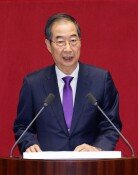Time for entrepreneurship
Time for entrepreneurship
Posted August. 07, 2024 08:11,
Updated August. 07, 2024 08:11
Thunder echoed across Seoul on Monday afternoon, particularly in the stock exchange market. A more than 8% plunge in stock prices that day caused turmoil among "Koreants," who feared their stock accounts might be shattered by the "thunder" from the U.S. However, the ever-falling share prices showed a slight rebound on August 6, starting from the NYSE futures market and spilling over to the Korean and Japanese stock exchanges for an unprecedented recovery.
It is difficult to pinpoint exactly why the market is behaving this way. Over the past two years, stock markets welcomed negative U.S. employment signals because they indicated that the FED might cut the benchmark interest rate sooner in response to a sluggish economy marked by unemployment and slowed inflation. However, worse-than-expected unemployment figures have led directly to fears of an economic downturn, causing excessive fear to dominate the market beyond actual indicators. The formula of bad economic news being good for the financial market was broken.
In July, the AI bubble theory emerged from Wall Street, suggesting that monetizing AI is harder than expected and that investment in the sector is overheated. AI, which had symbolized hope, became a subject of doubt in just one month, with its future utility questioned. Elliott Investment Management warned investors that AI was hyped and offered only incremental software improvements. Goldman Sachs, which had noted last year that AI would change the future, recently cautioned that the AI bubble would eventually burst. To make matters worse, Microsoft, Amazon, and Google all reported less-than-expected quarterly earnings. The AI bubble theory has become a dominant narrative.
Despite the news of disappointing quarterly performances, none of the M7, the seven magnificent tech giants leading the stock market, posted losses. It seems more likely that the market is asking them to cut investments or show better results to justify such high share prices. Tech giant CEOs responded to Wall Street's pressure: Google CEO Sundar Pichai emphasized that over-investment is better than under-investment during times of transition, while Meta CEO Mark Zuckerberg noted that the current situation requires taking the risk of building capacity before it's needed rather than being too late. This marks the beginning of a divergence in visions between Silicon Valley and Wall Street.
Nevertheless, it would be rushed and far-fetched to conclude AI is useless just because share prices are tumbling. There is no investment in future technologies that does not require taking risks. Entrepreneurship is what strikes a balance between companies and the financial market. We must remain firm and move toward future growth engines when the world is in chaos and no one seems to have answers. Korean companies that have jumped onto the global AI value chain should also stay vigilant and prepare long-term plans.







